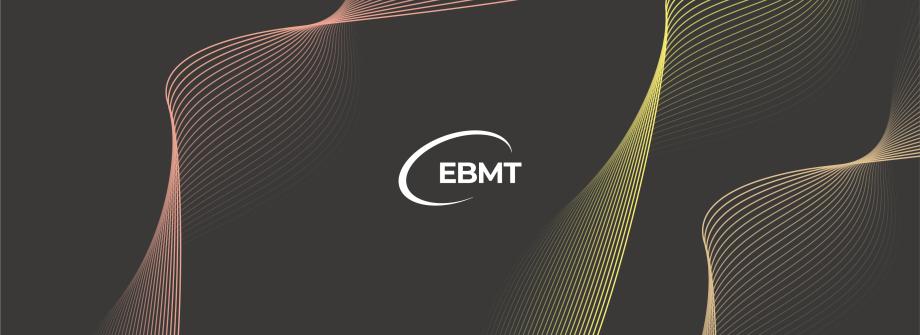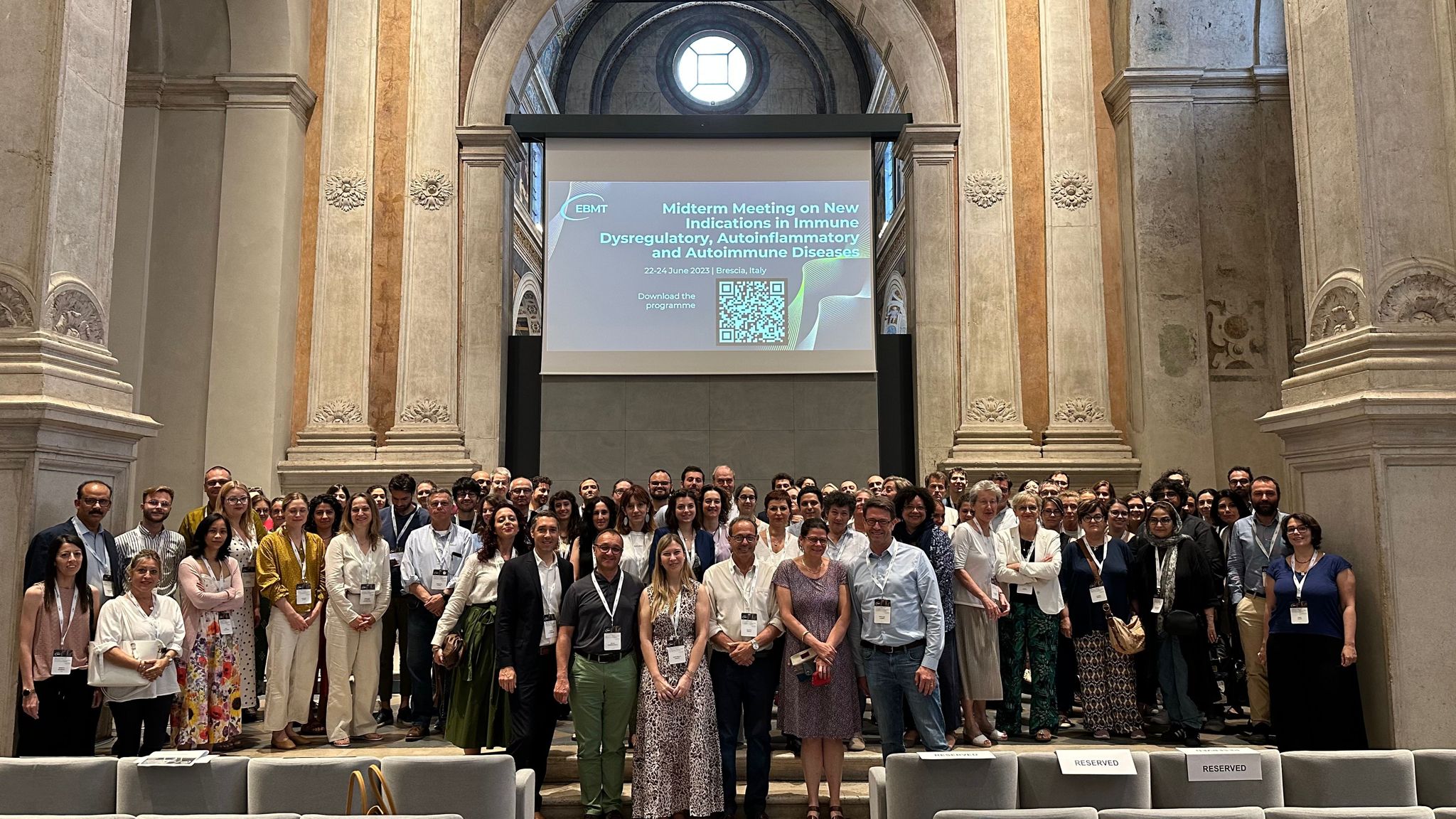
Summary written by Benedetta Elena Di Majo, University of Milano-Bicocca, Milan, Italy and Marianna Maffeis, Children's Hospital, Spedali Civili, Brescia, Italy
Focus on paediatrics (Benedetta Elena Di Majo) and inborn errors of immunity (Marianna Maffeis)
Bénédicte Neven introduces the role of HSCT in inborn errors of immunity (IEI) with a paediatric perspective during the first session of the Meeting, chaired by the host of the Meeting Fulvio Porta and Fabio Candotti. Prof Neven underlines the importance of tailored timing, donor, and conditioning choice in these patients. Selim Corbacioglu closes the session presenting the future of cellular therapies, reminding the importance of balancing conventional treatment, feasible but not always curative, and novel disease modifying therapies, such as CAR-T cells.
Christian Hedrich from University of Liverpool opens the II session, chaired by Aleixo Muise (Canada) and Raffaele Badolato (Italy), presenting genetics in lupus, disease characterized by an earlier disease onset, more sever courses and bad prognosis. The session continues with Eleonora Gambineri explaining the mechanism of autoimmunity in IEI, and highlighting the immune defects behind paediatric cancer. The “complicated (un)balance” between IEI and blood malignancies reveals the need for an interdisciplinary approach for diagnosis and management.
The first day meeting concludes with John Snowden reviewing the EBMT guidelines for transplant indications. Arjan Lankester from Leiden University Medical Centre as third speaker of the “Key steps in the procedure” session focuses on conditioning and serotherapy for IEI, showing interesting data about the association among ATLG exposure, acute graft versus host disease (aGVHD) and disease relapse.
The session closes with Fulvio Porta brilliantly describing the role of low-dose radiotherapy highly effective if included in conditioning regimens in paediatric patients.
On the meeting second day, session IV is chaired by Alice Mariottini. During the session Isabelle Meyts describes remarkable results of HSCT in paediatric patients affected by Adenosine deaminase 2 (ADA2) deficiency.
The “Hematopoiesis session” (VI), begins with Prof Aiuti presenting ADA deficiency focusing on autoimmune dysregulation and purine metabolism; during this session Dr Achini explained autoHSCT in pediatric cytopenia, while Jérome Hadjadj underlines the monogenetic causes of cytopenia.
“Scleroderma and other skin diseases” session is chaired by Dominique Farge and Arjan Lankester for the meeting second day afternoon. CTLA-4 insufficiency alloHSCT data is elegantly shown by Thomas Fox, which may increase the risk of graft failure and GVHD, while CAR-T cells might offer a cure without immunological complications of alloHSCT.
Stefano Volpi follows with an excellent talk about HSCT in ARPC1B disease and other actinopathies, conditions characterized by the coexistence of inflammation, autoimmunity, and defective immune response.
The day concludes with the systemic inflammation session, starting with Juliana M. F. Silva who describes an up-to-date overview of alloHSCT for severe, refractory, juvenile idiopathic arthritis. Dr Avcin follows presenting IEI with inflammatory osteoarticular involvement and several clinical cases.
This engaging session concludes with a case presentation by Dr Baresi (Brescia Pediatric BMT Unit) regarding a patient affected by sideroblastic anemia with B-cell immunodeficiency, periodic fevers, developmental delay (SIFD) due to novel bi-allelic TRNT1 mutations, who was successfully treated with HSCT.
The last day starts off with the IX “heart and lung” session chaired by Tobias Alexander and Selim Corbacioglu with a fascinating case presentation by Dr Wiecha (Poland) about a triple HSCT in a boy with refractory systemic juvenile idiopathic arthritis. The patient first received two autoHSCT and one final alloHSCT, which was the only successful treatment, achieving full and durable chimerism and allowing long-term treatment-free remission.
“Gastroenterologic inflammatory diseases” session (X) is chaired by Michael Albert and Francesco Onida. Daniel Kotlarz and Aleixo Muise explain respectively “monogenetic causes of IBD” and “genetic predisposition to IBD” elucidating the complexity of the genetic landscape of Very Early Onset Inflammatory Bowel Disease (VEO-IBD), where next-generation sequencing (NGS) is now recommended since the identification of monogenic IBD causes is critical for patients’ clinical management.
The session concludes with a single centre case presentation by Stefano Rossi about two paediatric patients affected by IL10R deficiency treated with CBU HSCT.
The last session (XI) focuses on novel non-transplant approaches. Dr Seidel explaines targeted therapy in monogenetic IEI. New therapies include B cell/plasmacell-directed (anti BAFF-R, TACI Ig), T cell-directed (anti CD3, anti CD40, anti ICOS, anti OX40), CARs, drugs targeting pDCs (anti BDCA2), immune proteasome inhibitors, new antinflammatory therapies (anti IL18 strategies, quercetin, oral NLRP3 inhibitor), new kinase-directed drugs (anti TYK2), combination of existing drugs (e.g. Rituximab + Bortezomib).
A key intervention by Dr Doglio from San Raffaele Hospital follows, showing excellent pre-clinical data in humanized mouse model of systemic lupus erythematosus (SLE), infused with CAR-Tregs, which confer new antigen-specific suppressive capacities and confirm CAR-Tregs safety and efficacy. The meeting concludes with a case report by Dr Di Majo, who highlights CAR-T toxicities by presenting a paediatric patient affected by refractory relapsed B-ALL treated with anti-CD19 CAR-T cells, who experienced severe immune effector cell associated HLH-like syndrome.
Summary written by Carmelo Gurnari, Tor Vergata University, Rome, Italy
The second session of the morning “Lupus and vascular diseases” kicks off with Tobias Alexander providing a broad overview of the state of the art of transplantation in lupus outlining latest research data including potential role of cellular therapy and analysis of transcriptome changes upon transplant. Marie Louise Fremond follows with a talk on HSCT in interferonopathies, a variegated group of disease characterized by molecular and clinical heterogeneity. Mathieu Puyade focuses then on Behçet's disease, its clinical criteria for diagnosis and treatment algorithm with allocation of patients to transplant and opportunities for improving outcomes. The session finishes with Giorgio Orofino, from S.Raffaele Hospital of Milan presenting a first-hand experience of HSCT in 2 patients with neuromyelitis optica and a meta-analysis of previous literature experience.
The meeting keeps going with the “Hematopoiesis” session, co-chaired by Alessandro Aiuti and Bénédicte Neven. Alessandro Aiuti kicks off with an overview of autoimmune complications in ADA-SCID and gene therapy strategies for this disorder. Federica R. Achini follows with a talk aiming at elucidating the role of autologous transplant in the treatment algorithm of immune-mediated cytopenias of childhood. The session continues with Jérome Hadjadj who guides the audience through genetic causes of cytopenias and offer a rational approach to diagnose and treat these disorders. Lastly, Carmelo Gurnari and Alessandro Bruno intertwine by offering a vision at a glance of VEXAS, a novel monogenic, somatic disorder linking autoinflammatory and hematological manifestations including MDS. HSCT seems the only curative approach but must be judiciously considered according to individual patients’ characteristics, as explained by Alessandro Bruno.
Summary written by Vera Radici, Unit of Blood Diseases and Bone Marrow Transplantation, Cell Therapies and Hematology Research Program, Department of Clinical and Experimental Sciences, University of Brescia, ASST Spedali Civili di Brescia, Italy
Focus on systemic inflammation
A cross-cutting theme that was addressed in various pathologies in its different facets was systemic inflammation. Dr. Juliana M.F. Silva (UK) explored the role of allogeneic hematopoietic stem cell transplantation (HSCT) for severe/refractory juvenile idiopathic arthritis (JIA). It remains an alternative option for patients with refractory and/or complicated systemic JIA. Promising results have currently been shown for interstitial lung disease, which also leads to improved lung function. Therefore, standardized recommendations for transplantation are needed, including indications and optimal timing. Furthermore, in future perspectives, it will be important to investigate the analysis of biomarkers to assess the response to therapy. All these findings should not overlook short- and long-term follow-up reports related to the quality of life.
Dr. Tadej Avcin (Slovenia) elegantly presented the main inborn errors of immunity (IEI), mainly discussing immuno-osseous dysplasias and inflammatory bone/articular disorders (non-infectious, such as monogenic arthritis and monogenic osteitis). In 2022 Dr. Tangye reported the updated classification of inborn errors of immunity (a total of 485), compiled by the International Union of Immunological Societies Expert Committee (doi: 10.1007/s10875-022-01289-3). Underlying the osteo-articular involvement in IEI are immune-osseous dysplasias, auto/hyperinflammatory mechanisms, granulomatous inflammation, and alterations in bone metabolism. A common feature of autoinflammatory bone diseases is chronic non-infectious osteomyelitis, often associated with a plethora of other clinical manifestations. Alterations in the inflammasome underlie many IEIs, playing a key role in the physiological homeostasis and pathology of bone. A dysregulated inflammasome is associated with pathological maturation and bone loss, leading to 'inflammasomopathies'. These alterations are often caused by an imbalance of certain cytokines, making overproduction of IL-1β a potential therapeutic target, for example, with anti-IL-1 drugs. HSCT offers a chance to control and cure autoimmune diseases that are refractory to different conventional/biological lines of treatment in selected cases, emphasizing the clinical overlap between IEI, autoimmunity and autoinflammation.
Dr. Giulia Baresi (Italy) discussed a novel syndrome called SIFD (sideroblastic anemia with B-cell immunodeficiency, periodic fevers and developmental delay) due to novel bi-allelic TRNT1 mutations successfully treated with HSCT. This syndrome presents features of autoinflammation and immunodeficiency associated with hematological and metabolic abnormalities. Manifestations caused by TRNT1 mutations are highly heterogeneous, requiring comprehensive examinations for evaluation. Prompt and effective treatment positively affects the prognosis. Therapeutic approaches require further investigation. HSCT can be curative for patients with a severe phenotype or refractory response to conservative treatments.
Summary written by Rosamaria Nitti, Vita-Salute San Raffaele University, Milan, Italy
Focus on autoimmune diseases
In the field of HSCT for adult autoimmune diseases, the indication for autologous HSCT is now a standard of care for multiple sclerosis and systemic sclerosis. In the Midterm Meeting, the attention shifted to organ specific effects of transplant, rare diseases and approaches alternative to autologous transplant.
Lung and esophageal involvement in systemic sclerosis and the tools to study the effect of transplant on these organs were the focus of talks by Prof Farge (session IX) and Prof Storek (session VII); Dr Boffa (session IV) showed the effect of autologous HSCT on neuroinflammation in MS using advanced MRI techniques. Once again, their data shows how transplant is effective in blocking inflammatory activity, but cannot reverse tissue scarring. For local damage like skin ulcers, mesenchymal stromal cells may have a benefit, as discussed by Dr Del Papa (session VII).
Evidence about autologous HSCT role in autoimmune diseases, rare or rarely treated by transplant, was presented: Prof Sharrack talked about in experiences Chronic Inflammatory Demyelinating Polyneuropathy, Neuromyelitis Optica (NMO) and Stiff Person’s Syndrome (session IV), Dr Alexander presented on Systemic Lupus Erythematosus (including data from the ASSIST trial on SLE, session V), Dr Puyade showed data about Bechet’s Disease (session V), Dr Salas about Chron’s Disease (session X). A recurring concept was that, even when relapses occur, after autologous HSCT patients tend to respond to medications they were refractory to before transplant.
Allogenic HSCT has a role in autoimmune diseases too, in selected patients. Provocative data were shown about allogenic transplant in Chron’s Disease by Professor Burt (session X) and long term follow up after allogenic HSCT in NMO was presented by Dr Orofino (session V).
In the final session (XI), pioneering data about anti-CD19 CAR-T cell therapy in AD were presented by Dr Müller, including immune reconstitution after CAR-T in the first SLE patients series, and the first report about CAR-Ts in Systemic Sclerosis and Anti-Synthetase Syndrome. CAR-Treg therapy, as discussed by Dr Doglio, is another promising tool in the autoimmune diseases field.
Overall, in the effort to improve feasibility of transplant and cellular therapies, the hematologist cannot do without a tight cooperation with disease specialists, fundamental in patient selection and response evaluation.
